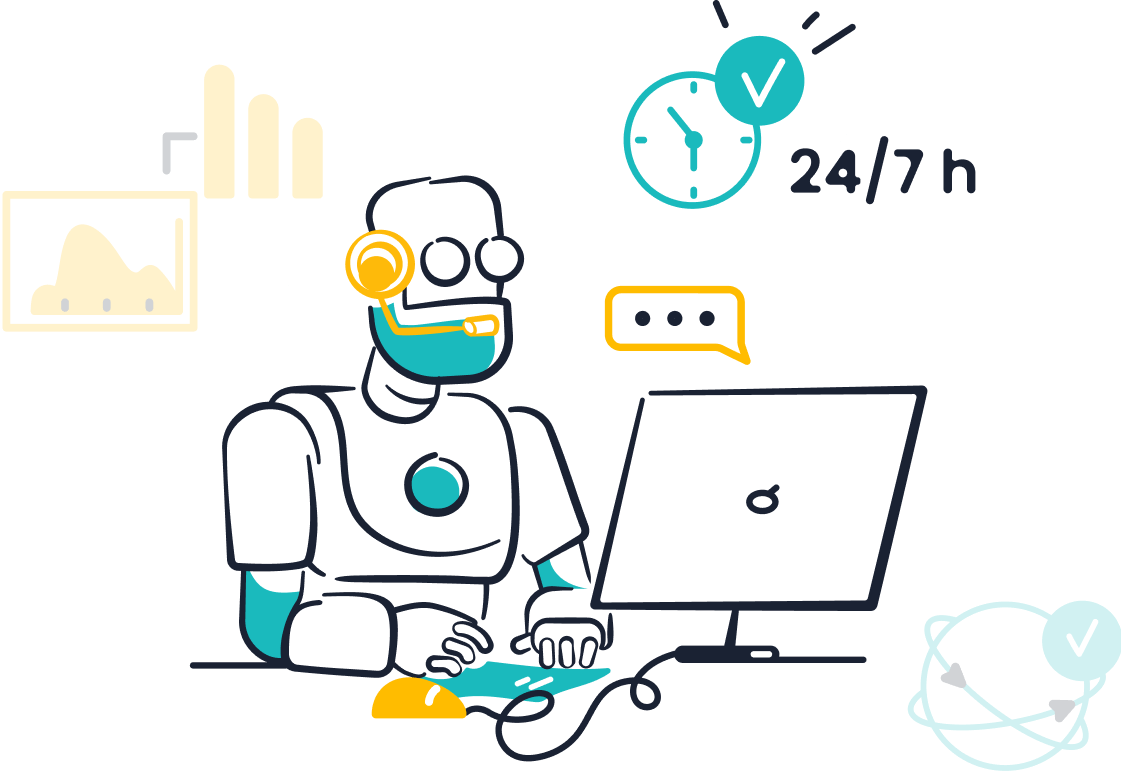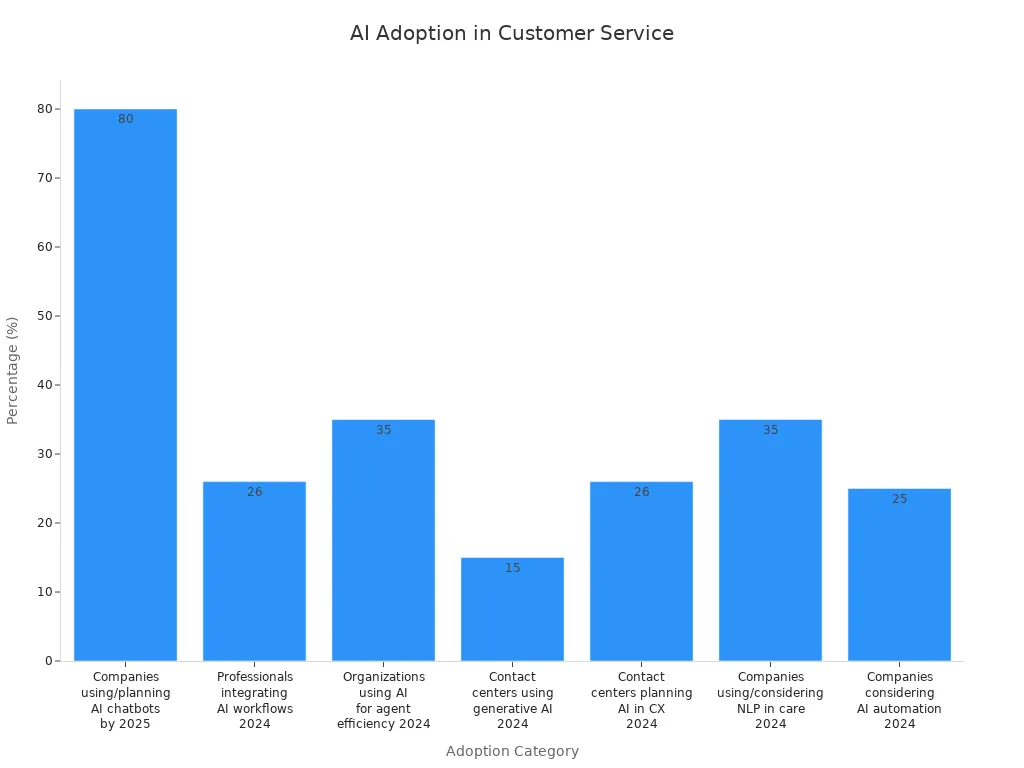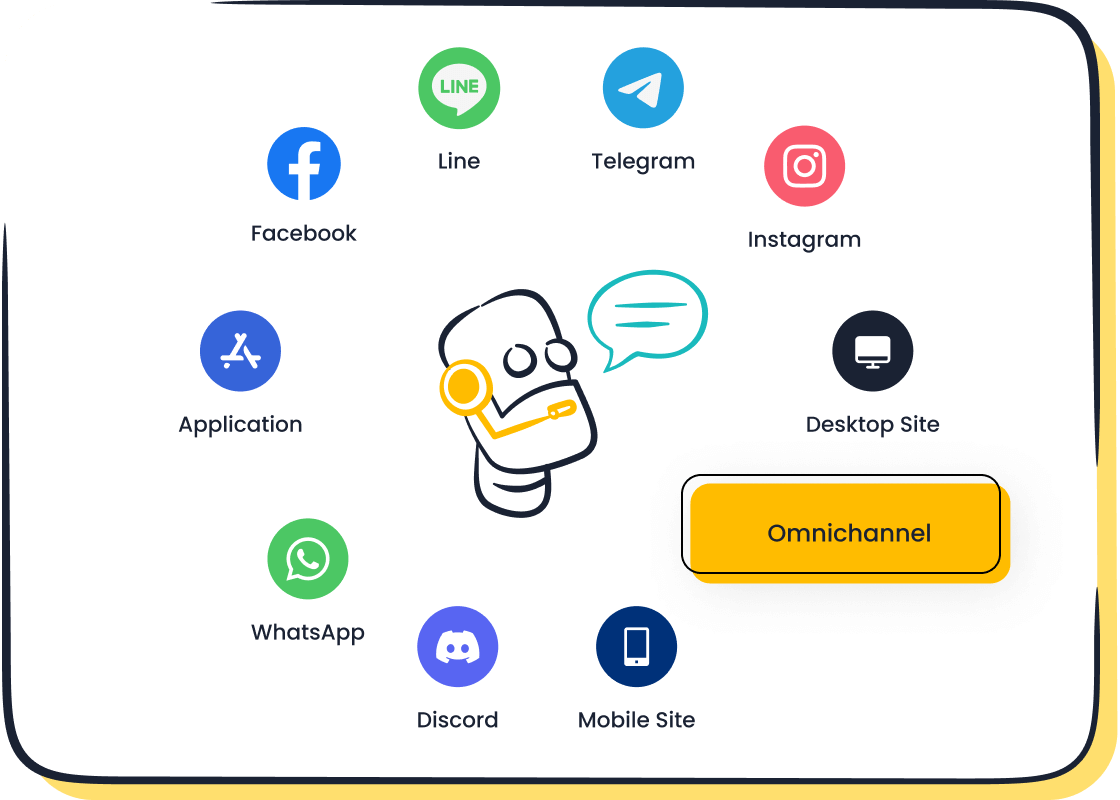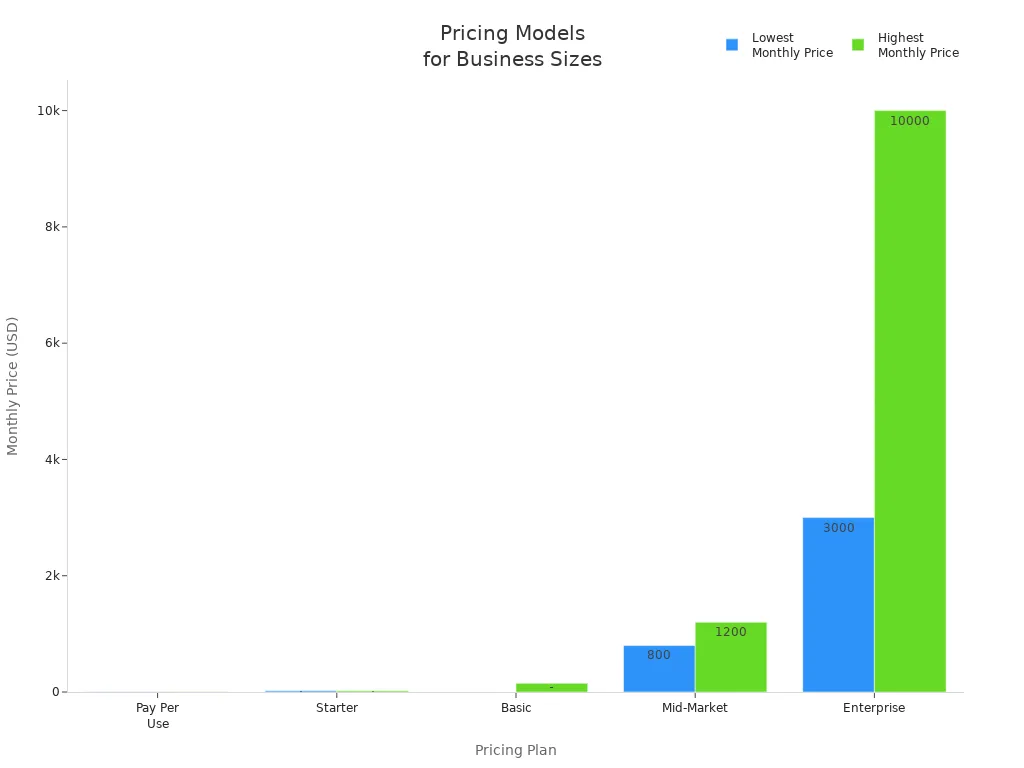Automate Customer Service Find the Best Solution for Your Business

Businesses automate customer service to boost satisfaction and streamline operations. Today, 80% of companies plan to use AI-powered chatbots by 2025, helping customers receive instant support and reducing costs. Matching automation solutions like Sobot AI and Sobot call center to business needs lets organizations resolve up to 80% of routine customer service inquiries, freeing agents for complex issues. Effective solutions improve customer satisfaction, lower response times, and enhance efficiency for customers across industries.

Customer Service Automation Overview

What Is Customer Service Automation
Customer service automation uses software, artificial intelligence, and workflow automation to complete customer support tasks without direct human involvement. Businesses rely on these systems to answer questions, route inquiries, and solve problems quickly. Common customer service automation solutions include chatbots that provide instant responses, automated ticket routing, and AI tools that personalize support using customer data. For example, Sobot offers AI-powered chatbots and omnichannel customer service solutions that help companies deliver fast, consistent support across multiple channels. These tools handle routine queries, update order statuses, and escalate complex issues to human agents, improving response times and reducing support volume.
| Automation Type | Description | Benefits |
|---|---|---|
| Chatbots and Conversational AI | AI-powered bots answer FAQs and personalize responses using knowledge bases. | Reduces call volume, provides 24/7 support, improves satisfaction. |
| Smart Ticket Routing | Assigns tickets to the right agent based on customer info and issue type. | Balances workload, reduces resolution time, improves satisfaction. |
| Knowledge Base | Self-service libraries with tutorials and troubleshooting guides. | Empowers customers, reduces agent workload. |
Why Automate Customer Service
Companies automate customer service to improve scalability, efficiency, and customer satisfaction. Automation enables businesses to handle large volumes of customer inquiries quickly, ensuring faster response times and better resource allocation. Automated customer service solutions provide rapid, consistent, and personalized responses, which enhances the overall customer experience. These systems also reduce operational costs by minimizing the need for a large support staff and enable 24/7 service for customers in different time zones. Sobot’s customer service automation solutions empower employees by freeing them from repetitive tasks, allowing them to focus on complex customer interactions.
Tip: Businesses should map current customer service processes and set clear goals before implementing automation. This approach ensures a smooth transition and maximizes the benefits of customer service automation.
Key Benefits for Businesses
Customer service automation delivers measurable benefits for businesses of all sizes. Companies report enhanced agent productivity, as automation offloads repetitive tasks and allows agents to focus on personalized customer support. Automation reduces error rates and operational costs, while increasing the speed of response. Studies show that customer satisfaction scores can improve by 10–20% after implementing customer service automation solutions (McKinsey). Automation also enables 24/7 availability and supports omnichannel communication, meeting customers where they are. Sobot’s customer service solutions, for example, help businesses achieve higher first contact resolution rates and improve customer loyalty through proactive customer service and self-service options. As customer experience automation grows, businesses can expect even greater efficiency and satisfaction for both customers and support teams.
Essential Features in Customer Service Solutions
AI and Automation Capabilities
Modern customer service solutions rely on advanced AI and automation to deliver fast, accurate support. AI chatbots handle routine questions, provide instant answers, and route tickets to the right agents. This intelligent automation reduces wait times and increases agent productivity by up to 40%. Companies using ai customer service report a 62% drop in inquiry resolution times. AI-powered chatbots also offer 24/7 support, ensuring customers always receive help. Sobot’s ai chatbot included in its platform uses a knowledge base to answer questions, guide customers, and escalate complex issues. Real-time agent assistance and predictive analytics further improve customer interactions. Effective use of ai features like sentiment analysis helps agents respond quickly and appropriately. Automation tools streamline follow-ups and ticket management, freeing agents for more complex tasks. Businesses see higher satisfaction and more efficient customer service automation when they prioritize these capabilities.
Note: AI support and intelligent automation empower teams to handle three times more tickets without extra staff.
Omnichannel Support
Omnichannel communication stands as a core feature in customer service automation. Customers expect to reach brands through chat, email, social media, and phone without losing context. Omnichannel customer service solutions unify these channels, creating seamless experiences. Companies with strong omnichannel strategies retain 89% of customers, compared to 33% for those with weak approaches (source). Sobot’s omnichannel solution integrates chat, voice, and messaging apps, allowing agents to manage all customer interactions in one workspace. This multichannel integration reduces friction and boosts satisfaction. Self-service offerings, such as knowledge bases and chatbots, let customers find answers independently, improving efficiency and loyalty. Consistent, personalized support across channels increases retention and lifetime value.
Integration and Scalability
Integration and scalability ensure customer service automation grows with business needs. Customer service solutions must connect with CRM, email, and other platforms to give agents a unified view of customer data. Seamless integration prevents service outages and speeds up issue resolution. Sobot’s platform supports integration with popular business tools, making it easy to centralize customer interactions. Scalability allows solutions to handle more users and advanced features as companies expand. Cloud-based and modular systems, like Sobot’s, support flexible growth and maintain high performance. Strong integration and scalability maximize ROI and keep customer service efficient as demands change.
| Feature Category | Description and Benefits for SMBs |
|---|---|
| Omnichannel Ticketing | Manages inquiries from multiple channels in one system, improving response consistency. |
| AI-Powered Chatbots | Automates responses, freeing staff for complex issues and speeding up service. |
| Self-Service Portals | Lets customers find answers independently, reducing support load and improving satisfaction. |
| Automation Tools | Automates ticket routing, prioritization, and follow-ups to increase efficiency. |
| Analytics and Reporting | Provides insights into interactions and team performance to optimize service quality. |
| SLA Management | Tracks response and resolution times to ensure service level agreements are met. |
| Knowledge Base Management | Centralizes information for faster, more accurate problem resolution. |
| CRM and Third-Party Integration | Connects data and workflows for seamless, personalized service. |
Top Customer Service Automation Software


Sobot Chatbot and Omnichannel Solution
Sobot stands out in the customer service automation software market with its all-in-one platform. The company offers a unified solution that brings together chat, voice, email, and messaging channels. Businesses can manage every customer interaction in one place, making support faster and more consistent. Sobot’s chatbot uses advanced AI to answer questions, guide users, and escalate complex issues to human agents. The chatbot supports over 30 languages, enabling global businesses to serve customers in their preferred language. This multilingual capability helps companies increase customer satisfaction by up to 25% and reduce operational costs by 30%.
Sobot’s Five-AI system, launched in 2024, includes Omnichannel AI, Scenario-based AI, Multi-faceted AI, Generative AI powered by leading large language models, and Secure AI for data privacy. The platform’s AI Agent can handle chat, voice calls, and email ticketing, providing human-like, culturally sensitive responses. Sobot’s chatbot can extract and manage knowledge bases from uploaded files, reducing management costs and improving accuracy. The no-code setup allows businesses to deploy automation quickly, even without technical expertise.
Sobot integrates with major e-commerce and CRM platforms, such as Amazon, Shopify, and Salesforce. The solution offers over 300 statistical reports with thousands of indicators, giving managers deep insights into team performance and customer needs. Sobot’s pricing is competitive, often half the cost of similar customer service software, with no hidden fees. The company provides dedicated support teams, including sales, pre-sales, and customer success managers, ensuring timely assistance for every client.
Note: Sobot’s comprehensive approach covers every stage of the customer journey, from sales to support, making it a strong choice for businesses seeking scalable customer service automation.
Zendesk, Salesforce, Intercom, and Others
Many businesses consider Zendesk, Salesforce Service Cloud, Intercom, and other platforms when choosing customer service automation software. These solutions are frequently recognized for their robust automation, AI chatbots, and omnichannel support. Zendesk and Intercom offer easy-to-use interfaces and strong workflow automation. Salesforce Service Cloud provides a 360-degree view of the customer, advanced case routing, and powerful analytics. These platforms support integration with popular business tools and offer scalable options for growing companies.
Other notable customer service software includes Freshdesk, Zoho Desk, and Help Scout. Freshdesk is known for its affordability and automation features, making it suitable for small to medium teams. Zoho Desk offers strong integration capabilities and self-service options. Help Scout provides simple, automated ticketing and is cost-effective for smaller teams.
Industry reviews highlight several important criteria for evaluating customer service automation software:
- AI and automation capabilities, such as chatbots and intelligent routing
- Integration with CRM and communication platforms
- Omnichannel support for chat, email, phone, and social media
- Ease of use and quick implementation
- Customization and flexibility for different business needs
- Security, compliance, and reliable vendor support
Top-rated platforms, according to recent industry reviews, include:
- Zendesk
- Freshdesk
- Intercom
- Salesforce Service Cloud
- Genesys Cloud CX
- Zoho Desk
- Help Scout
These platforms receive high marks for their automation, chat features, and ability to scale with business growth. Pricing, ease of setup, and compliance also play a key role in user satisfaction. For example, Salesforce Service Cloud holds a 100% customer satisfaction rating from over 587 verified G2 reviews, praised for its SLA management and deep customization. Zendesk and Intercom are recognized for their automation and AI-driven workflows, but their pricing may be challenging for small businesses.
Tip: When selecting customer service software, companies should consider their current needs, future growth, and the level of support required for successful implementation.
Comparison Table
The following table compares leading customer service automation software on key criteria, including AI capabilities, integration, omnichannel support, ease of use, customization, security, support, pricing, and target users.
| Platform | AI & Automation | Integration | Omnichannel Support | Ease of Use | Customization | Security & Compliance | Support & Training | Pricing Highlights | Ideal Business Types |
|---|---|---|---|---|---|---|---|---|---|
| Sobot | Advanced AI chatbot, voicebot, multilingual, knowledge base automation | Deep CRM, e-commerce, API | Chat, voice, email, messaging | No-code setup | High, scenario-based | Secure AI, privacy focus | Dedicated teams, 24/7 | Competitive, often half of others | Retail, finance, education, global enterprises |
| Zendesk | AI bots, workflow automation | CRM, helpdesk, APIs | Chat, email, phone, social | User-friendly | Moderate | Industry standards | Extensive resources | Starts $49/agent/mo | SMBs, enterprises, support teams |
| Salesforce SC | AI, predictive support, case routing | Deep CRM, APIs | Email, chat, phone, social | Moderate | High | Enterprise-grade | Training, onboarding | Custom, higher cost | Large enterprises, deep analytics |
| Intercom | AI chatbots, automation | CRM, APIs | Chat, email, messaging | Intuitive | Moderate | Standard | Online resources | Starts $74/mo, higher for AI | SaaS, tech, startups |
| Freshdesk | Automation, ticketing | CRM, APIs | Chat, email, phone | Easy | Moderate | Standard | Online support | $18–$95/agent/mo | SMBs, growing teams |
| Zoho Desk | AI, automation | Zoho suite, APIs | Chat, email, phone | Easy | Moderate | Standard | Online support | Affordable | Small to medium businesses |
| Help Scout | Automation, ticketing | CRM, APIs | Email, chat | Simple | Limited | Standard | Online support | Cost-effective | Small teams, simple needs |
| Genesys Cloud CX | AI, omnichannel | CRM, APIs | Chat, voice, social | Moderate | High | Enterprise-grade | Training, onboarding | Custom | Large enterprises, contact centers |
Key criteria for comparison include AI and automation, integration, omnichannel support, ease of use, customization, security, support, pricing, and fit for business size.

Sobot’s customer service software delivers strong value for businesses of all sizes. The platform’s AI and multilingual chatbot can handle up to 95% of customer interactions, reducing response times and improving satisfaction. Sobot’s automation features help companies cut costs and boost productivity. The omnichannel solution ensures customers receive consistent support across chat, voice, and email. Sobot’s integration with leading CRM and e-commerce platforms makes it easy to centralize customer data and streamline workflows.
When comparing customer service automation software, companies should look for:
- AI-powered chatbots that provide instant, accurate answers
- Omnichannel support to unify chat, voice, and messaging
- Integration with existing business tools
- Flexible pricing that matches business size and needs
- Strong security and compliance features
Sobot’s customer service software meets these criteria, offering a comprehensive solution for businesses seeking to automate customer service and improve efficiency. The platform’s no-code setup, advanced AI, and dedicated support teams make it a top choice for organizations aiming to deliver exceptional customer experiences.
Choosing the Best Customer Service Software
Assessing Business Needs
Selecting customer service software starts with a clear understanding of business goals and customer expectations. Companies should follow a step-by-step approach:
- Build a centralized knowledge base to support self-service and guide both customers and staff.
- Add chatbots tailored to preferred customer channels, ensuring easy escalation to human agents.
- Implement automation options that eliminate routine tasks and enable event-driven workflows.
- Identify gaps in support processes and automate standard tasks to reduce manual work.
- Start small by setting up rules and testing internally before launching to customers.
- Analyze customer needs, focusing on high-volume, simple tasks for automation.
- Flag tasks that require human expertise or empathy.
- Choose customer service software with strong integration and AI capabilities.
- Test automation processes using analytics and quality assurance.
- Continuously monitor and improve automation using customer feedback.
Tip: Companies should prioritize customer service software that aligns with their business impact and supports ongoing improvement.
Evaluating Integrations
Integration plays a critical role in maximizing the value of customer service software. Businesses should:
- Check if the software connects seamlessly with existing tools like ticketing systems, knowledge bases, and collaboration platforms.
- Assess whether integration reduces workflow disruptions and ensures reliable data flow.
- Consider how integration centralizes information and simplifies processes.
- Determine if automation across systems reduces manual effort and boosts efficiency.
- Review vendor support and community feedback for real-world integration performance.
Sobot offers robust integration capabilities, connecting with CRM platforms and business tools to streamline operations for industries such as retail, banking, healthcare, and education.
Testing and Support
Testing customer service software before full deployment ensures reliability and security. Best practices include:
- Set up a production-like test environment with standardized configurations.
- Prioritize critical test cases based on business value and risk.
- Integrate automated tests with CI/CD pipelines for continuous feedback.
- Manage test data securely, using masking or anonymization.
- Select automation tools that match team skills and project needs.
- Incorporate security measures and group tests by functionality.
- Optimize efficiency by designing reusable test processes.
- Use agile tools to keep testing strategies flexible.
- Conduct risk analysis to focus on high-impact areas.
- Plan for rollback strategies and continuous updates.
Sobot supports diverse industries with flexible customer service software, offering AI technologies, omnichannel support, customizable workflows, and scalable infrastructure. The platform’s visual bot builder and multi-language support make it accessible for global teams.
| Industry | Application Example | Key Benefits |
|---|---|---|
| E-commerce | Real-time product support | Faster response, reduced workload |
| Banking | Automated account assistance | Instant answers, fewer calls |
| Healthcare | Appointment scheduling via chatbot | Improved engagement, less burden |
| Education | AI tutors for course questions | 24/7 support, enhanced learning |
Companies should choose customer service software that adapts to their industry needs and supports growth.
Sobot in Action: Customer Success Story
OPPO’s Results with Sobot
OPPO, a global leader in smart devices, faced a surge in customer inquiries during peak shopping seasons. The company needed a way to manage high chat volumes and maintain excellent customer satisfaction. OPPO chose Sobot’s AI-powered chatbot and ticketing system to automate routine support and streamline operations.
After implementing Sobot, OPPO saw impressive results. The chatbot resolved 83% of customer issues automatically, allowing human agents to focus on complex requests. This high resolution rate meant customers received faster answers through chat, reducing wait times and improving overall customer satisfaction. OPPO also achieved a 94% positive feedback score from users, showing that customers valued the quick and accurate support. Most notably, OPPO experienced a 57% increase in repeat purchases, proving that efficient chat support can drive loyalty and sales.
Sobot’s solution unified all customer communication channels, including WhatsApp and live chat, into one platform. Agents could view customer data and chat history in real time, making each interaction more personal and effective. The system’s easy-to-use interface helped OPPO’s team manage large chat volumes without losing quality.
Key Takeaways for Your Business
Businesses can learn several important lessons from OPPO’s success:
- Automation with AI chatbots and WhatsApp integration reduces response times and boosts customer satisfaction.
- Handling routine queries through chat automation frees agents for more complex customer needs.
- Seamless integration of preferred channels, like chat and messaging apps, increases engagement and satisfaction.
- A user-friendly platform helps teams manage customer interactions efficiently.
- Combining AI automation with human support ensures customers always get the right help.
To replicate OPPO’s results, companies should:
- Invest in AI-powered chat and automation tools to engage customers and improve retention.
- Build a unified customer data platform for a complete view of each customer’s chat history.
- Map customer journeys across all channels to deliver consistent experiences.
- Integrate omnichannel AI solutions for marketing and support.
- Monitor key metrics like chatbot resolution rate and customer satisfaction to refine strategies.
Companies that follow these steps can achieve higher customer satisfaction, faster chat response times, and stronger customer loyalty.
To automate customer service successfully, businesses should follow these steps:
- Assess support needs and identify areas for automation.
- Set up AI chatbots and build a knowledge base.
- Integrate channels and train agents for seamless workflows.
- Compare features, pricing, and support to maximize customer satisfaction.
- Test solutions like Sobot with a free trial or demo to ensure the best fit.
Exploring hands-on trials helps teams find tools that drive efficiency and lasting results.
FAQ
What is customer service automation?
Customer service automation uses software like chatbots to handle routine support tasks. Companies automate customer service to answer questions, route tickets, and provide instant help. Sobot’s platform automates up to 80% of inquiries, improving efficiency and satisfaction.
How does Sobot’s chatbot improve customer service?
Sobot’s AI chatbot operates 24/7, supports over 30 languages, and solves regular queries automatically. Businesses report a 70% boost in productivity and a 50% reduction in agent costs. The chatbot helps automate customer service for global brands.
Example: OPPO achieved an 83% chatbot resolution rate using Sobot’s customer service software.
Can customer service automation work across multiple channels?
Yes, omnichannel customer service automation lets companies support customers on chat, email, voice, and messaging apps. Sobot’s omnichannel solution unifies all channels in one workspace, making customer service software easy to manage and scale.
Is coding required to set up Sobot’s chatbot?
No coding is needed. Sobot’s chatbot uses a point-and-click interface. Users design workflows and automate customer service tasks without technical skills. This feature makes customer service software accessible for teams of any size.
What results can businesses expect from customer service automation?
Businesses see faster response times, higher satisfaction scores, and lower costs. For example, customer service automation helped OPPO increase its repurchase rate by 57%. Sobot’s customer service software provides analytics to track improvements and optimize support.
Learn more about Sobot’s solutions at sobot.io.
See Also
Ways AI-Powered Customer Support Software Enhances Productivity
The Leading Ten Customer Support Platforms To Try In 2024
Understanding The Effective Functioning Of Call Center Automation
Key Recommendations For Selecting Social Media Support Tools
